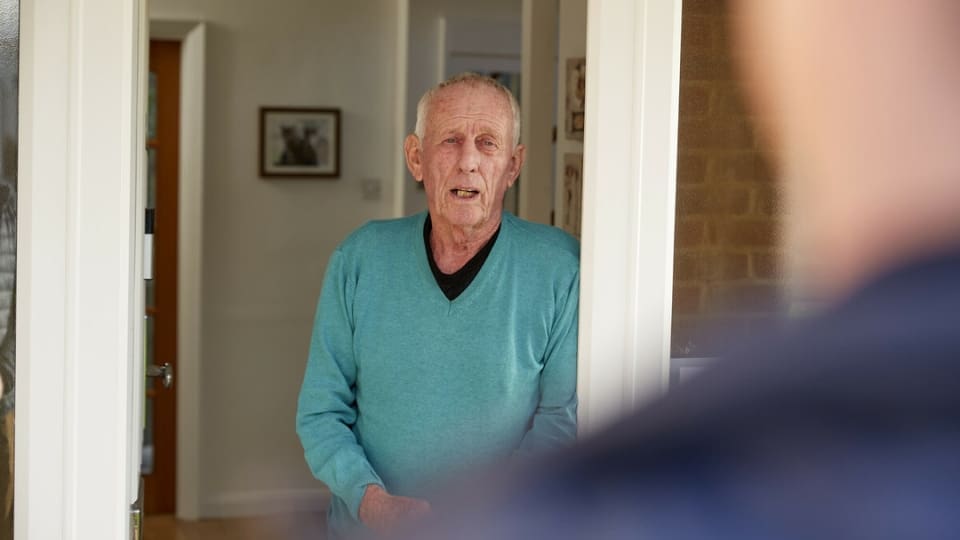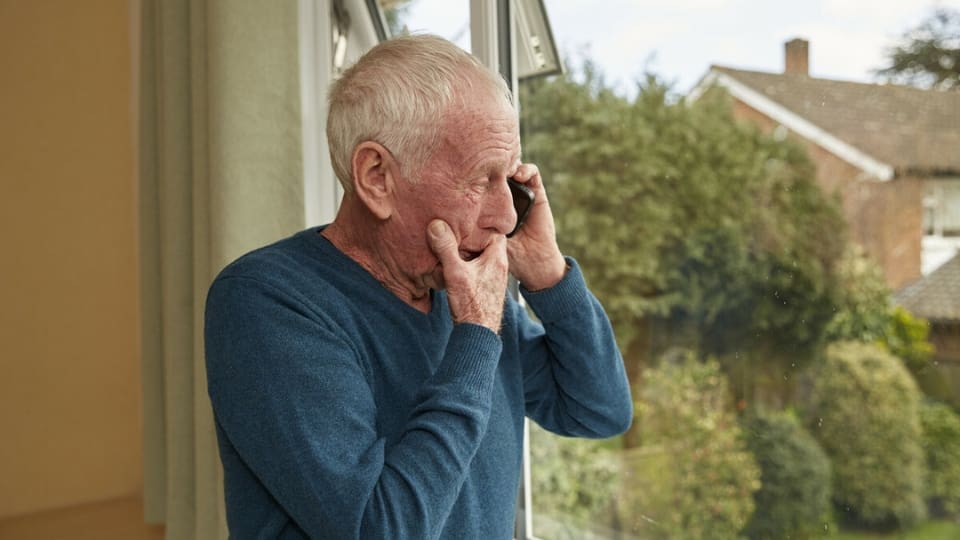Lasting power of attorney
A lasting power of attorney (LPA) is a legal document appointing one, or more, trusted people to be someone living with dementia's attorney.
People living with dementia may be more vulnerable to scams as a result of difficulties with judgement, decision-making, communication and understanding.
Our dementia specialist Admiral Nurses share advice on helping to prevent a person with dementia from being scammed.
A scam is any situation in which someone is tricked into doing something against their will, usually with the intention of accessing their money illegally. If a person is deceived into paying money, giving something away or doing something that they did not intend to or fully understand, they may have been scammed.
Anyone can be scammed, especially as scams are ever-changing and becoming more creative and harder to detect. But having dementia may make people more vulnerable to scammers for reasons including:
People with dementia may also lack mental capacity, which affects their ability to make informed decisions. However, it is important to understand that simply making a decision that you consider unwise (for example, giving away a sum of money) does not necessarily mean the person lacks mental capacity. It should always be assumed that a person does have mental capacity unless it can be proven otherwise.
Doorstep scams often involve rogue’ traders who claim there is something wrong with your property that they can ‘fix’. They may exert a lot of pressure, claiming that the problem is urgent, and typically demand payment upfront – usually in cash.
Some doorstep scammers may tell you that they are officials, such as police officers, or represent a utility company and need to read your meter or inspect your property for some reason.
Door-to-door sellers (eg double glazing, driveway paving) may try to pressure you to commit to time-limited offers, again usually requiring a cash payment upfront.
Some scammers pose as charity collectors to deceitfully make you part with cash or card details.

An email scam may be happening if you receive a message that claims to be from an official organisation such as your bank, HMRC, DVLA, TV Licensing etc and demands that you take urgent action. The email might say that you need to change your password, visit a website to claim a refund, or make a payment to upgrade your account.
You may receive what appears to be an enticing offer by email, for example saying that you have won a prize and need to visit a website or provide your bank details to claim it.
You may receive an unexpected email inviting you to invest in a product like cryptocurrency or bonds/shares. The email may pressure you with a time-limited offer or promise you interest rates that are much higher than elsewhere.
As with email scams, you may receive text messages that claim to be from an official source; require you to take urgent action (eg to change your password or make a payment to avoid a service being cancelled); or tell you that you have won a prize.
You may also receive a text asking for money from an unfamiliar number that claims to be from someone you know – for example, a message from ‘your daughter’ saying she is texting from someone else’s phone because she has broken her own phone and needs you to lend her the money to replace it.
Courier company scams are common, where they pretend to have an undelivered parcel for you.

Phone scams may involve the caller claiming that they are from an official organisation, like your bank, telling you that you need to take urgent action to avoid your account being closed, your password expiring, etc.
You may also receive ‘cold calls’ where someone tries to sell you something by phone, such as a new mobile phone contract or home improvements like solar panels. Or the caller may invite you to invest in a financial product like shares.
Another common phone scam is a caller claiming you have been involved in an accident and they can help you apply for compensation.

Dating and romance scams may be found across social media, but also on dating and gaming platforms. Frequent messaging (called ‘love-bombing’) may be followed with requests for money to cover an ‘emergency’ or advice around cryptocurrency.
A person who is trying to scam you in this way will typically have a false profile and have used someone else’s photo. They may also always seem to have a reason not to meet in person.
Dating scams may also take place in real life – for example, an acquaintance may try to build a relationship with you (often very quickly and intensely) to scam you out of money now or in the future.
Identity theft involves someone stealing your personal information (eg name, address, date of birth, bank details) to use fraudulently, for example to make a purchase or withdraw money from your bank account/transfer it to another.
If you care for someone with dementia, it is important to look out for evidence that they may have been scammed, for instance:
It is important to show patience and understanding if this happens as the person may already be feeling vulnerable and embarrassed.

If someone has dementia and has not already set up a lasting power of attorney (LPA), it is important for them to do so as soon as possible. This will allow a named trusted person to make decisions on their behalf if they lack the mental capacity to do so themselves.
There are two types of LPA: property and financial affairs, and health and welfare. A person with LPA for property and financial affairs will be able to do things like speak to the bank on behalf of the person with dementia, cancel subscriptions that they may have unwittingly signed up for, and place limits on how much money they can withdraw.
If you are worried about scammers accessing the person’s money, you could suggest that they place as much as they can afford in a savings account that is harder to access. This could limit how much could be stolen from their current account.
Another way to avoid the person with dementia being scammed into making large payments is by using a debit card pre-loaded with money, which can be overseen by another person if you wish. This can help to avoid them making large and fraudulent payments to scammers using their debit card.
Make sure you stay informed about current scams and warn the person with dementia and other people who support them about these so they can be on alert for anything suspicious.
‘Dementia: what next?’ online sessions
Admiral Nurse Dementia Helpline: call free on 0800 888 6678 or email helpline@dementiauk.org for confidential advice from a dementia specialist Admiral Nurse on scams or any other aspect of dementia.
Virtual clinic appointments: book a free, confidential phone or video appointment with an Admiral Nurse at a time to suit you.
Financial and legal sources of support
Finance and young onset dementia
Mental capacity and decision-making
Action Fraud
0300 1232040
Citizens Advice
Adviceline (England):0800 144 8848
Advicelink (Wales): 0800 702 2020
Crimestoppers (report crime anonymously)
0800 555 111
Cyber Aware (National Cyber Security Council)
Find your local authority Adult Social Care Services
Hourglass: information and support for older people at risk of or experiencing abuse or neglect
0808 808 8141
Mail Preference Service
020 7291 3310
Telephone Preference Service
0345 070 0707
Think Jessica: advice and support for victims of postal, phone and doorstep scams
New scams are emerging all the time. To ensure you are aware of the latest scams, you can sign up to the scam alert service from Which? to receive updates on any new scams that have been reported.
If you believe you have been scammed using your credit or debit card or by transferring money to someone’s bank account, contact your bank immediately. If you act quickly enough, it may be possible to stop the money leaving your account. If not, they may be able to recover your money or reimburse you.
Sometimes, when you log into an online account, you might see a notification that your password has been involved in a data breach. Do not panic if this happens. You should, however, change your password immediately and ensure that the new password is strong and safe – if you are changing your password on your phone, it will often suggest a strong password that you can use.
It is important not to use the same password for different accounts. If it is difficult to keep track of multiple passwords, you can use a password manager app to store them securely.
Our virtual clinics give you the chance to discuss any questions or concerns with a dementia specialist Admiral Nurse by phone or video call, at a time that suits you.
A lasting power of attorney (LPA) is a legal document appointing one, or more, trusted people to be someone living with dementia's attorney.

Our new, free online series, ‘Dementia: what next?’, is designed to help you learn more about dementia and the next steps you could take.
Information on the legal terms you might encounter when you care for someone with dementia, advice on the financial benefits that you may be able to claim, and details of services and organisations that can support you.
Social media scams
Social media scams use platforms like Facebook, X (formerly Twitter), Threads, TikTok, Instagram etc. This area evolves very rapidly, and scams are changing all the time. However, they may involve impersonation scams, where someone pretends to be a celebrity or public figure. They may use artificial intelligence (AI) to generate content or promote products using other people’s photos.
Fake profiles can be created easily on most platforms and are often used to deceive people out of money or personal information, eg your address.
Fraudsters are also rife on selling platforms like Facebook marketplace and will typically try to make you pay in advance for you something they do not have (often mobile phones/other technology or concert tickets), or a fake item. Also be aware of unfamiliar retailers advertising products like clothing, jewellery or holidays – while these may be genuine, they are often fake.
Tips for avoiding social media scams